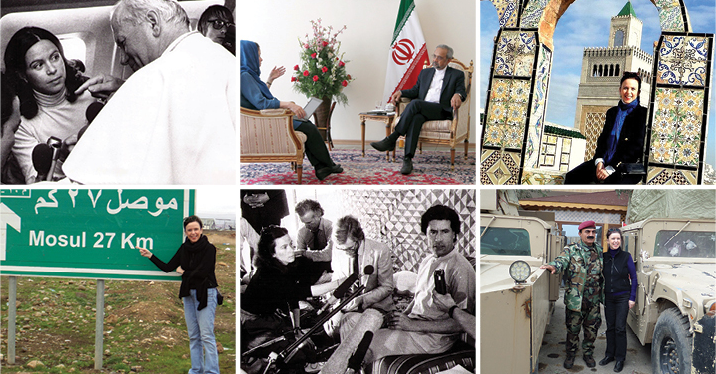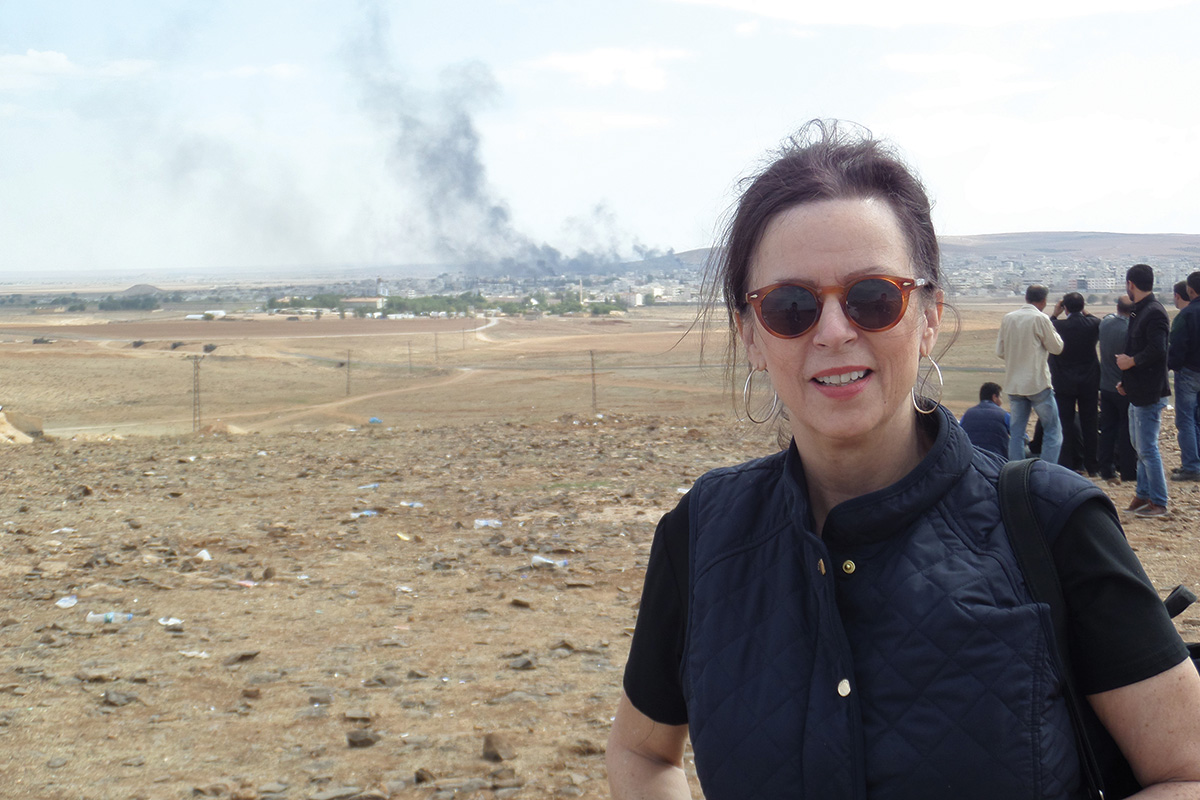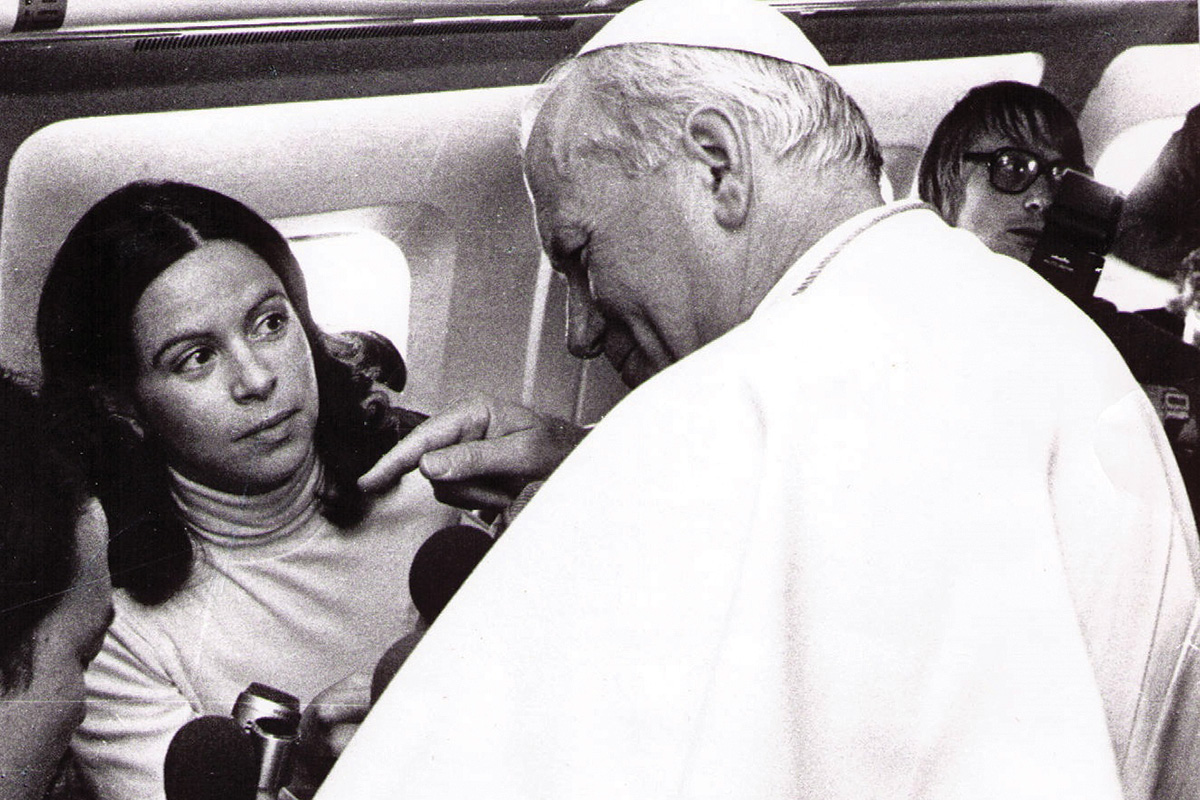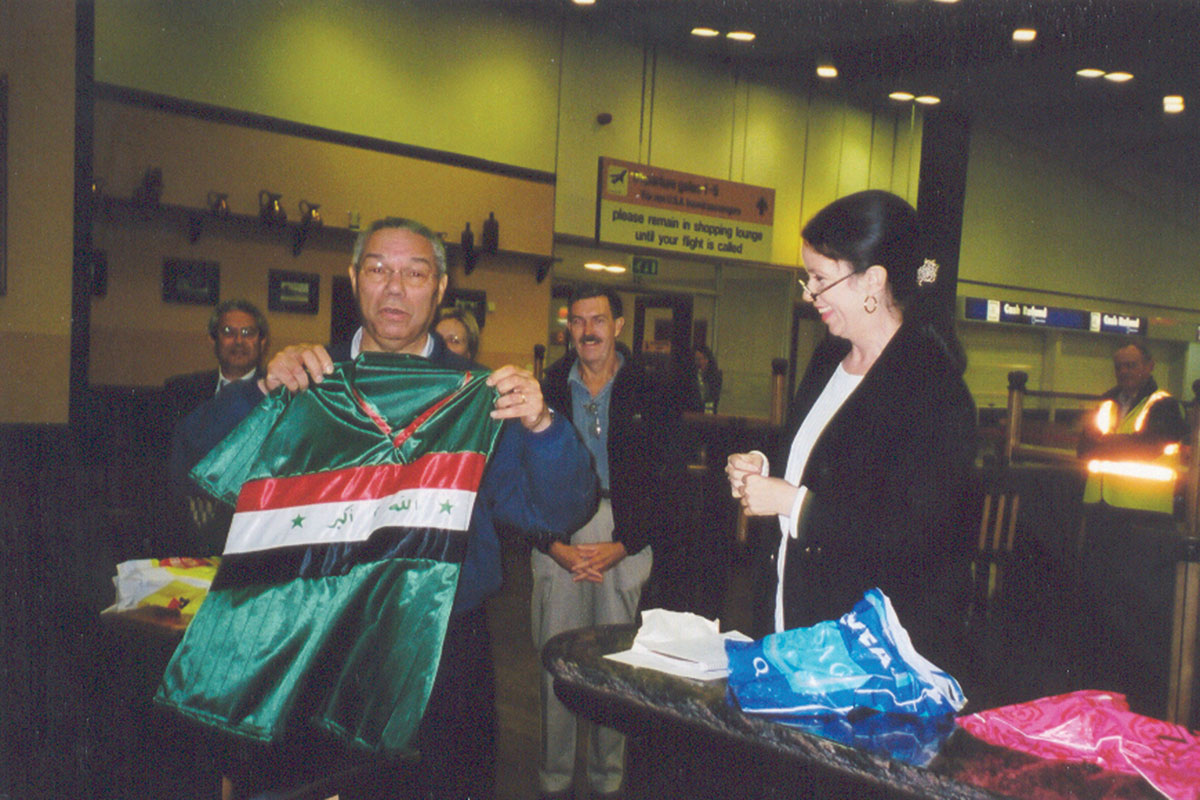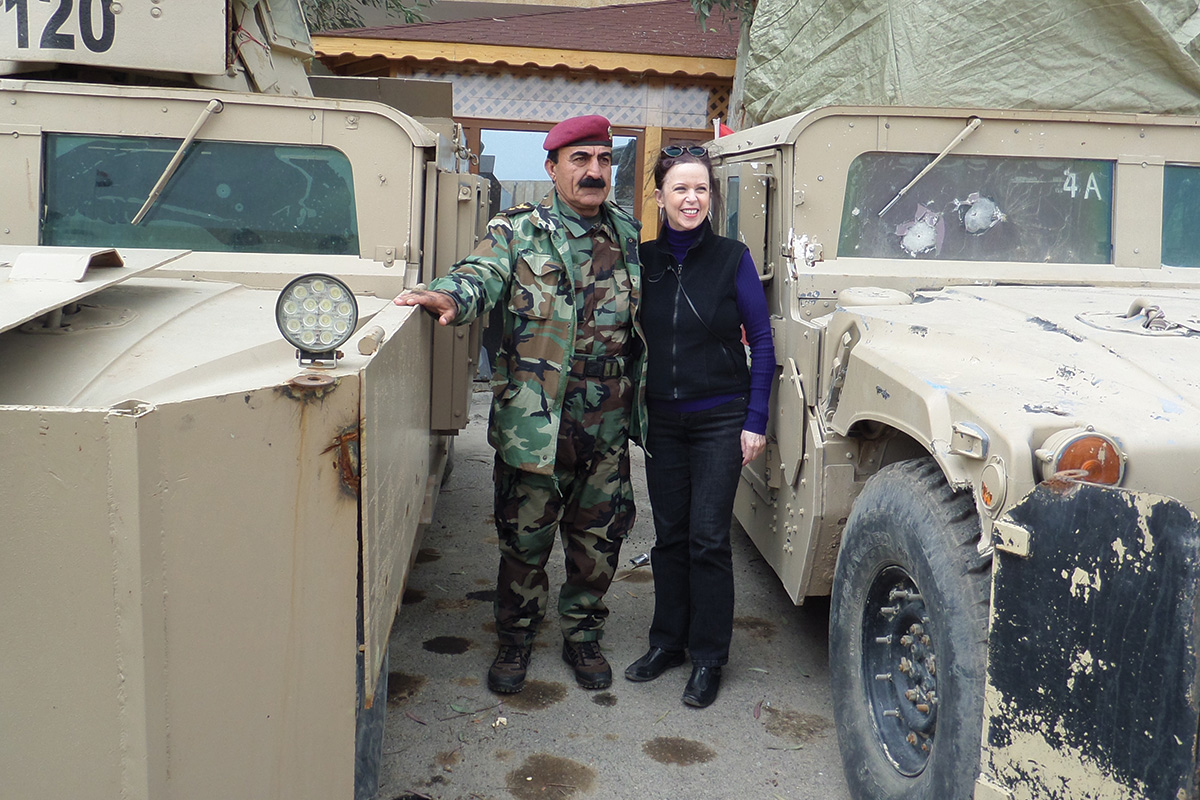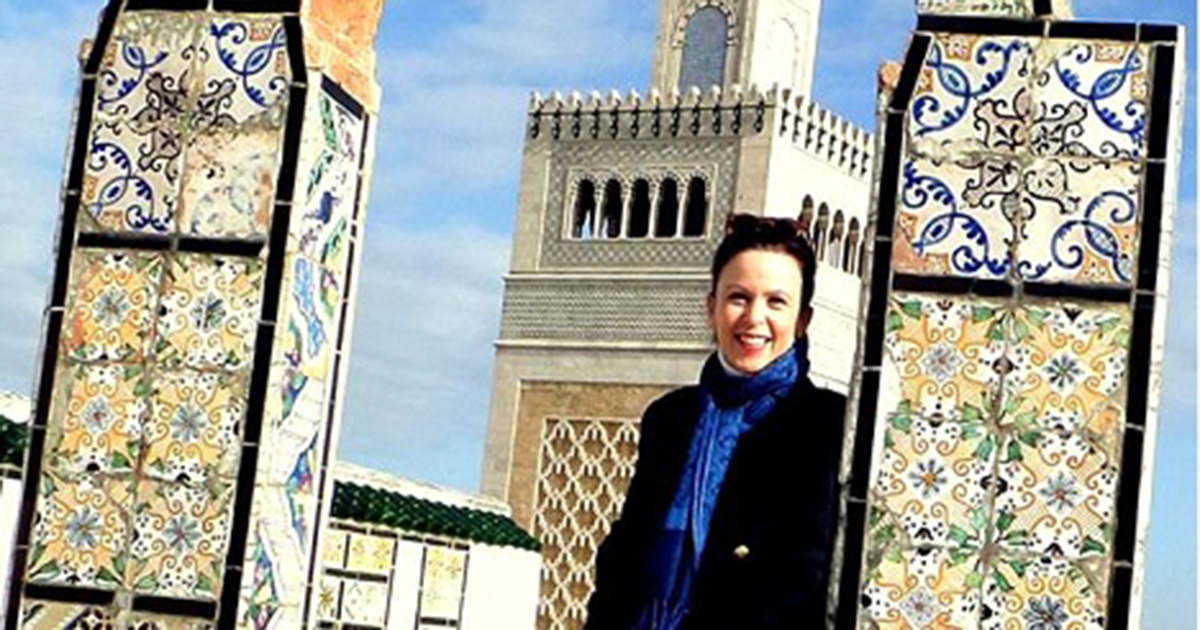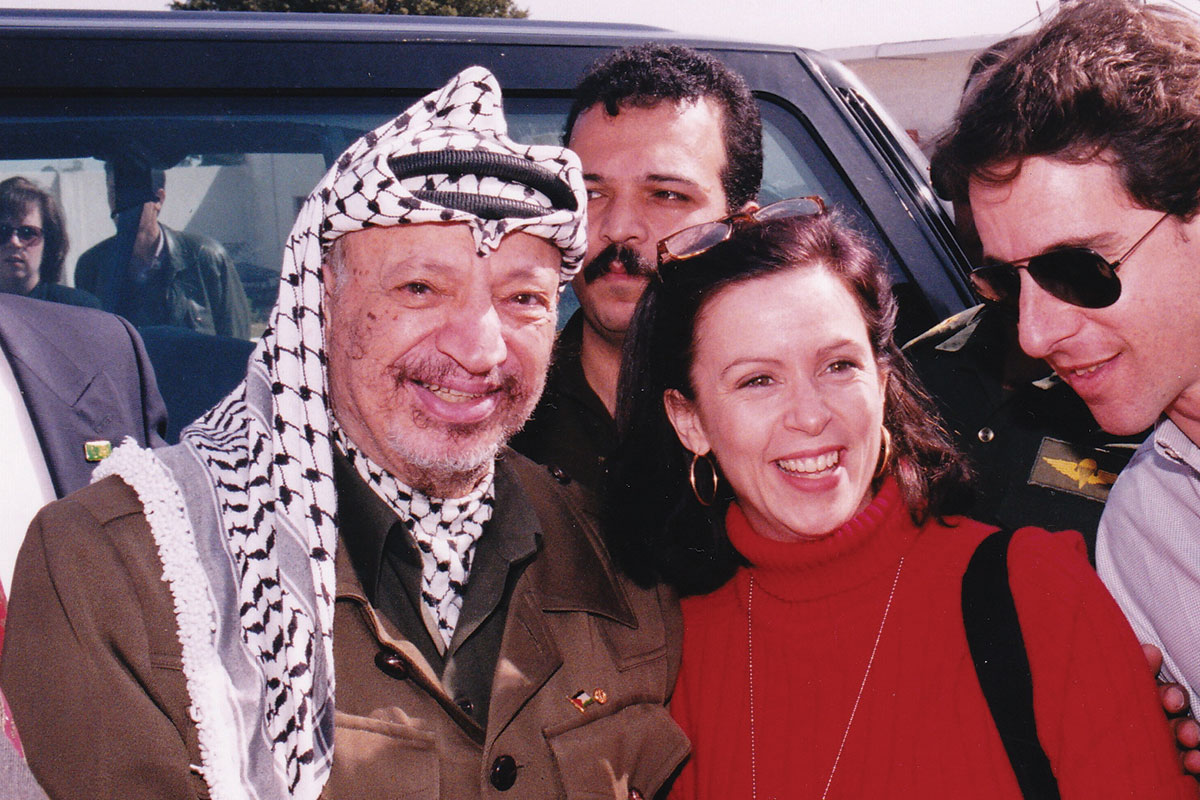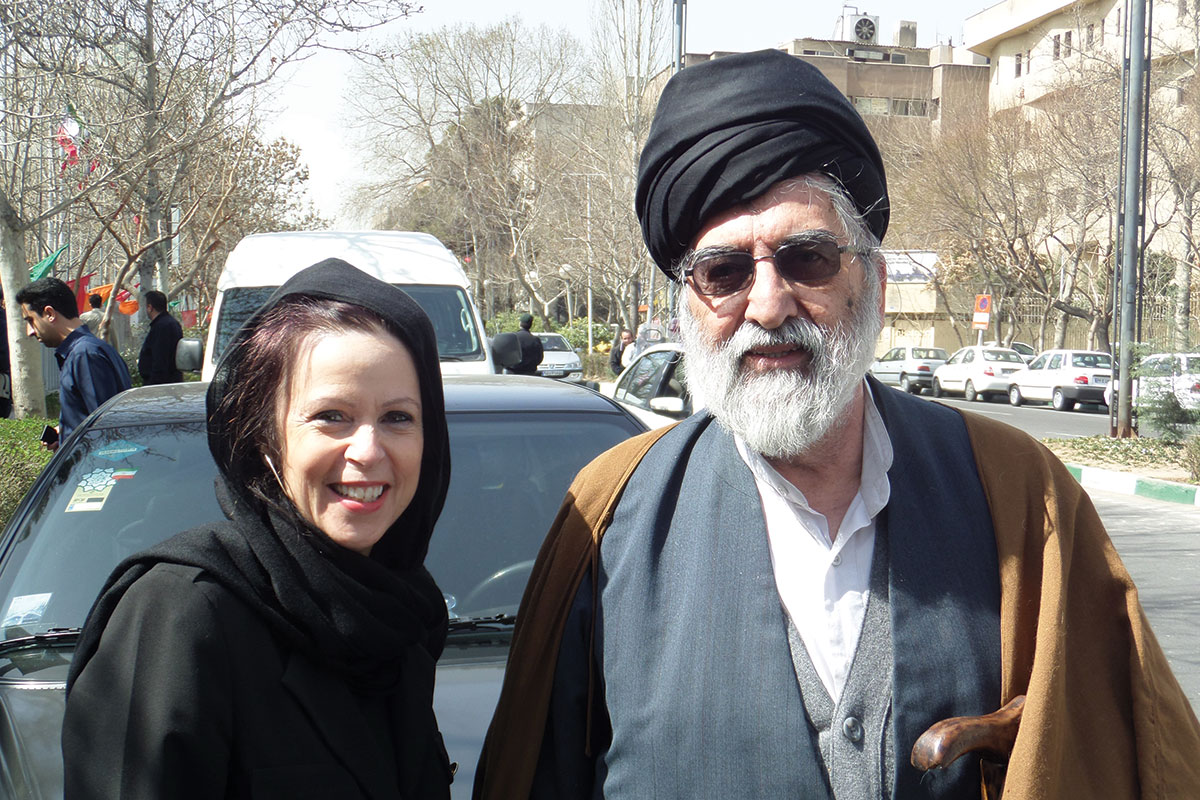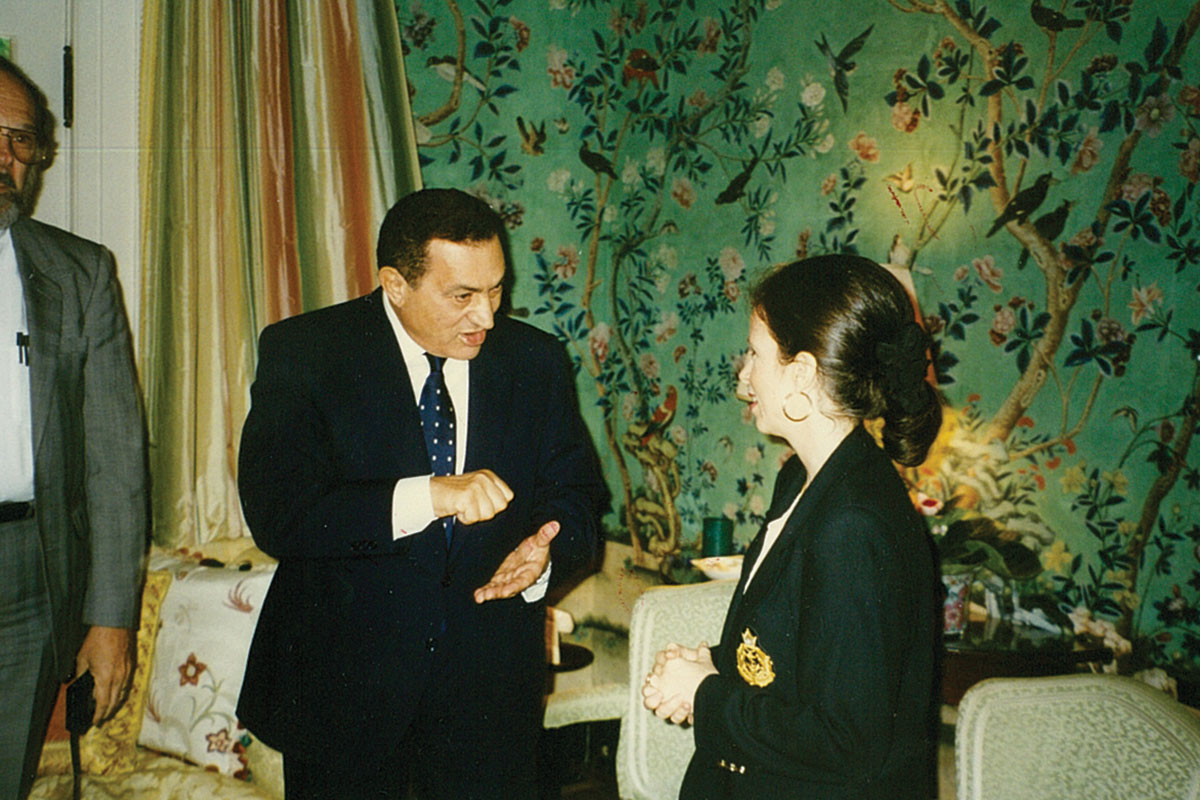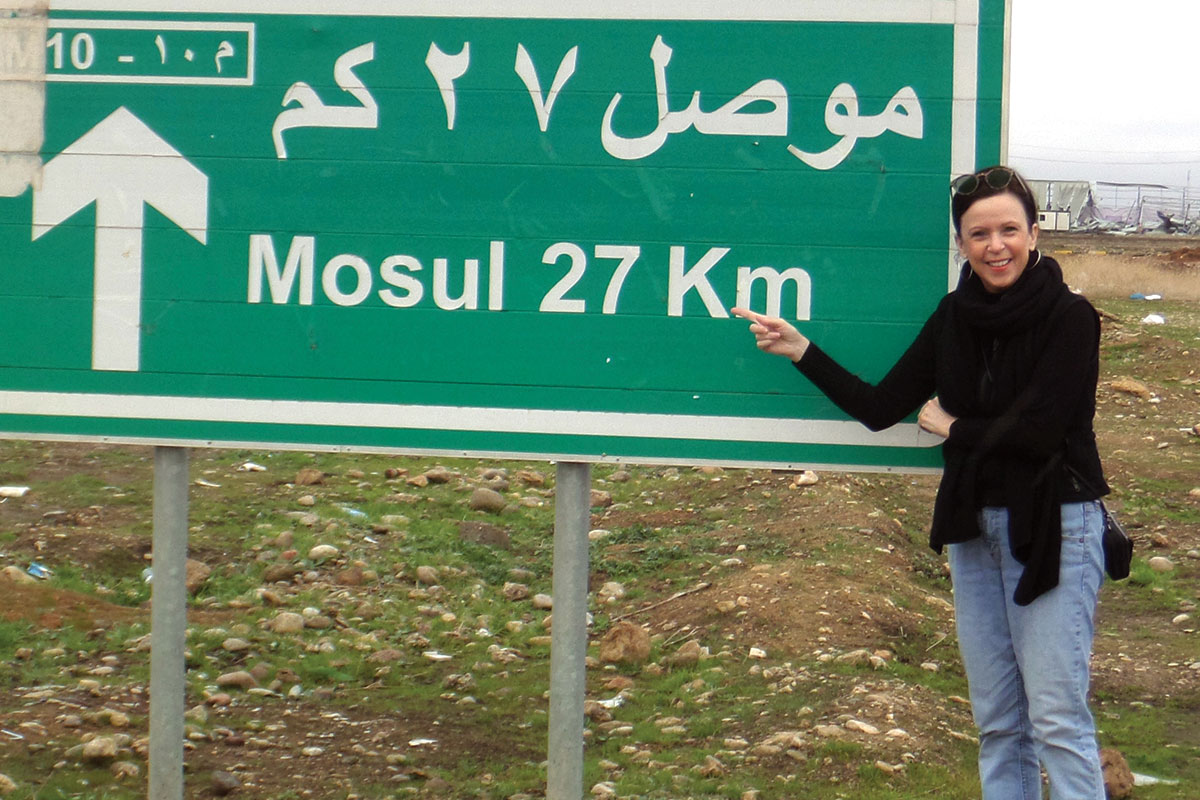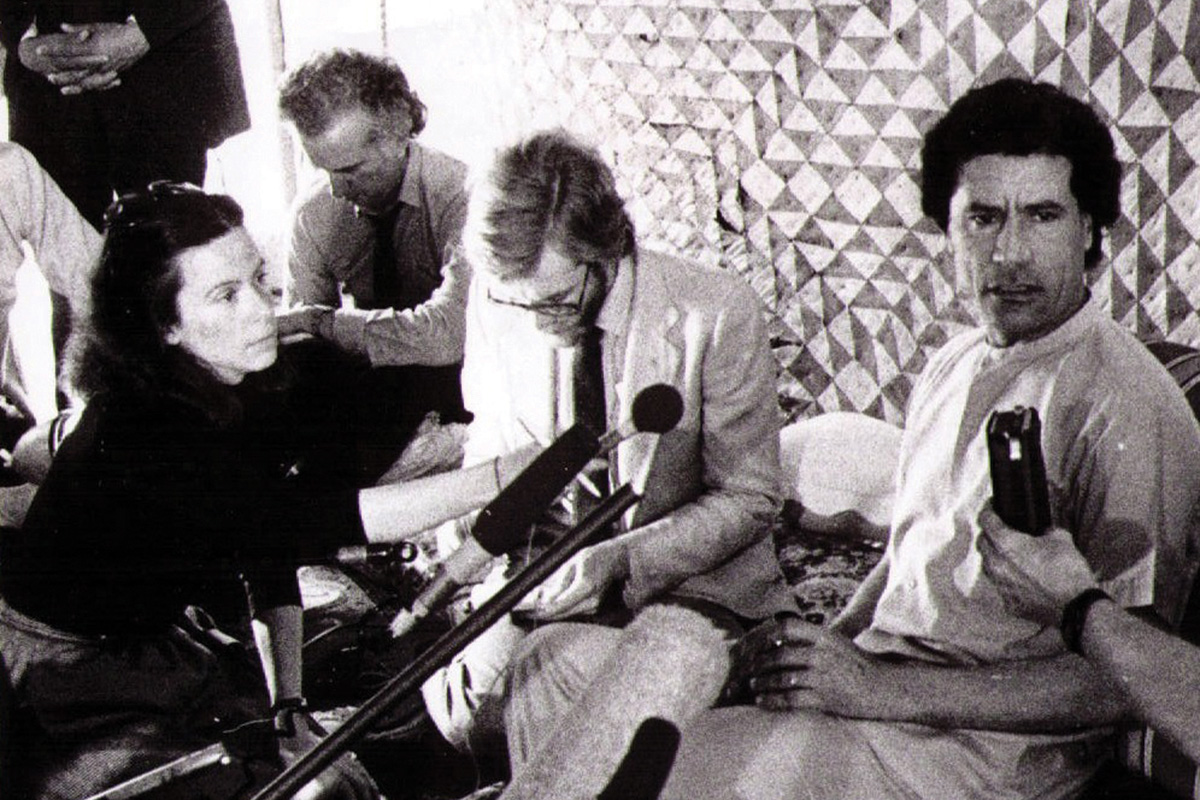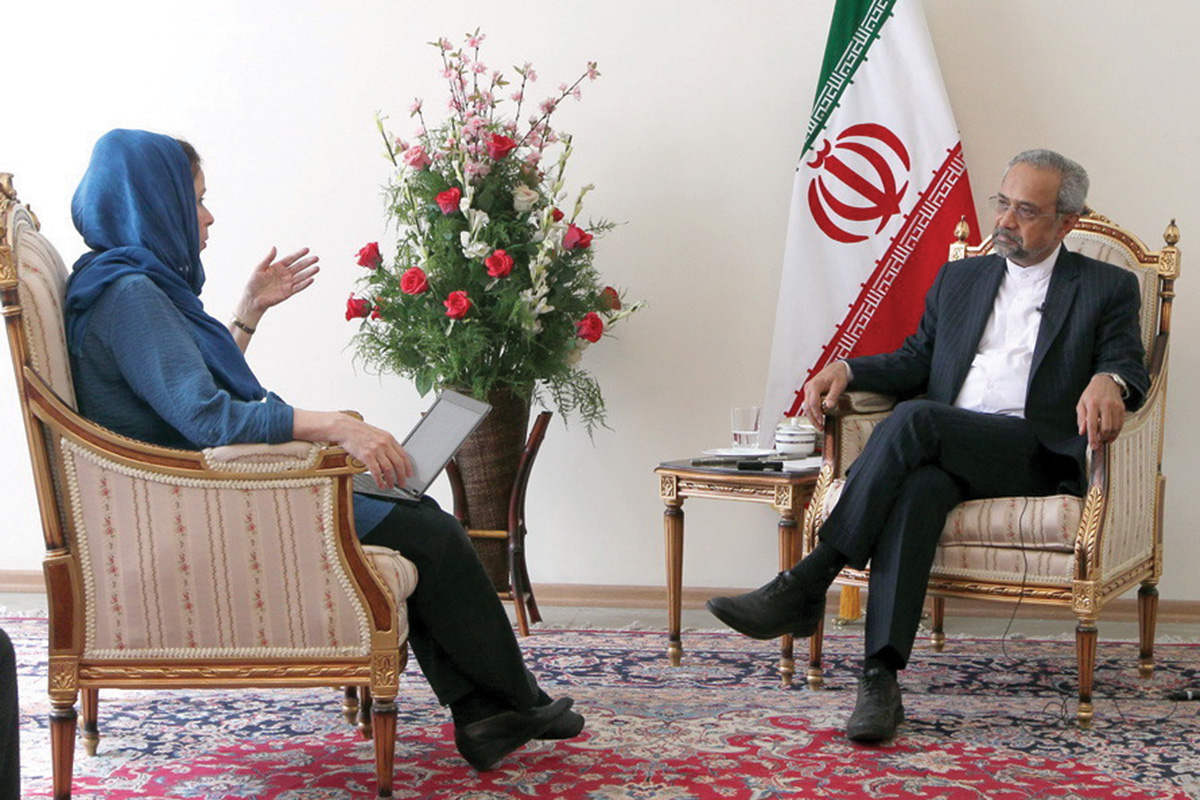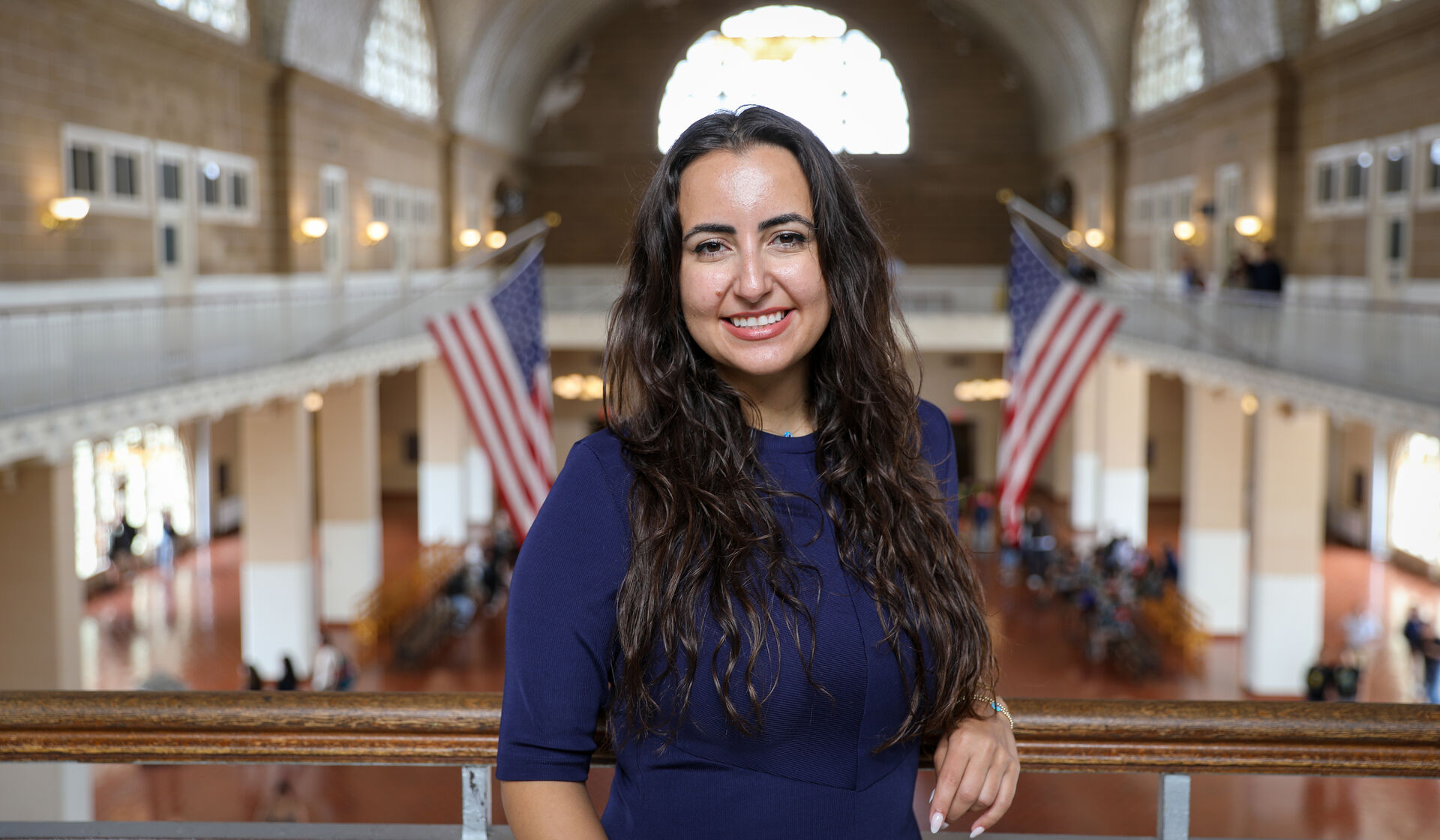For the last four decades, journalist, foreign affairs analyst, and author Robin Wright has traveled to the Middle East and other conflict zones. From The Michigan Daily to The New Yorker, she has not only broken numerous international stories, but also shattered barriers for female reporters.
Her career sounds like something out of a Hollywood thriller and makes you think the petite, 5-foot-1-inch, alumna is as fearless as they come. Robin Wright, ’70, MA’71, HLLD’15, laughs at the suggestion, despite reporting on more than a dozen wars, dining with dictators, and interviewing terrorists and notorious figures.
“I am a historian,” she says with a smile. ”So I guess at the end of the day, the chance to chronicle history gets me to do things I might otherwise fear.”
It is a sunny June day at her office at the U.S. Institute of Peace in Washington, D.C., where Wright is a joint fellow with the Woodrow Wilson International Center for Scholars, studying the Mideast. Greeting this guest in the lobby, she suggests we take the stairs to tour the building and better see the majestic views of the Lincoln Memorial. Later, when asked about her bravery, she answers, “I don’t think of myself as fearless at all. I am afraid of everything. I am afraid of elevators. That’s why we took the stairs.”
It’s a surprising admission from a woman who has been in danger countless times during a 40-year career that has taken her to more than 140 countries on six continents.
Her avoidance of elevators stems from a prison stint in Angola in the 1970s that left her claustrophobic. She was placed in solitary confinement after the Angolan government accused her of being a CIA agent working with mercenaries she had interviewed as a correspondent for The Washington Post. “In that environment, you don’t know if one minute has passed or one hour,” she says. “Your mind plays terrible tricks on you.”
She admits to being fearful ever since she was a child, a character trait her mother shared with her colleagues in 1977 when she accepted, on behalf of Wright, who was out of the country, an Overseas Press Club Award for “best reporting from abroad in any medium requiring exceptional courage and initiative.”
“My mother got up said, ‘I am delighted, but surprised, to accept this award for my daughter. She was so afraid of things as a child that I had to pay the neighbor boy to walk her to school until she was in the sixth grade.’ That’s a story I didn’t know. For all those years I thought that neighbor boy had a crush of me.”
Jana Hart Wright, now a dean at Columbia University School of the Arts, is Wright’s little sister. “My version of the story is that Robin was afraid because a local bully threatened her at the corner with a tree branch and helped prepare her to become a successful reporter in a violent world.”
In Kobani, Syria, in October 2014 during a U.S. airstrike. With Pope John Paul II as he returned to Italy from his tour of Asia in 1981. In Dublin, presenting a shirt to then-Secretary of State Colin Powell in 2003. With a Kurdish Peshmerga fighter in northern Iraq in 2016. In Tunisia in 2014, working as an international monitor during the first democratic presidential election after the revolution. In Gaza, with former PLO Chairman Yasser Arafat in 1996. In Tehran in 2015, with Iran’s ambassador to Italy in the early 1980s. With former Egyptian President Hosni Mubarak in 1995. On the front line in Mosul, Iraq, this past March. Interviewing Libyan revolutionary Muammar Gaddafi in his tent in Tripoli in 1980. Interviewing the chief of staff to the Iranian president in Tehran in 2015.
Wright grew up in Ann Arbor, born to what she describes as “great parents.” She frequently talks of her adoration for her father, L. Hart Wright, a professor at U-M’s Law School, and her mother, Phyllis, a community theater actress.
Her father adored sports and thought he would have sons. He ended up with two daughters. Every night around the dinner table, he would teach them about the world and the sports he loved—especially U-M sports.
She was accepted to other universities but chose to go to U-M, since it was affordable as an in-state student and she had grown up loving and admiring the institution where her father worked. “Michigan was, and is, a powerhouse’” she explains. “Why go anywhere else?”
Once there, a sorority sister invited her to come to a meeting at The Michigan Daily. She quickly realized her father would get a kick out of seeing her byline on a sports story, so she signed up, thinking she would write a single story to amuse him. Instead, she fell in love with writing and never stopped.
Her father wasn’t an affectionate man who offered hugs or said, “I love you,” but Wright’s bond with him was deep. “Our parents prepared us to think about the world and insisted we fulfill our responsibility to society. Robin took this to heart and is living it,” says Jana, who says her father and sister seemed to have a never-ending conversation that lasted 34 years.
It ended only when he died of cancer in 1983. Wright rushed home from covering the war in Beirut to sit vigil at his hospital bedside. Despite her loving presence, he continuously gestured for her to leave and return to work.
“I HAVE ALWAYS MADE A POINT OF GOING TO THE OTHER SIDE OF A WAR ZONE. I DON’T DO OUR SIDE. MY FATHER’S BEST ADVICE … WAS TO STAND ON TOP OF THE WORLD AND LOOK DOWN. SO I DO THAT WITH EVERY CONFLICT I COVER. I DON’T EMBED WITH AMERICANS.”
A pioneer for female journalists from the start, Wright was the first woman to become a sports editor on The Michigan Daily staff. She quickly made a deal with the athletes that she wouldn’t embarrass them by venturing into the locker room if they gave her exclusives. “So I always had great stories,” she says.
At the Rose Bowl in 1970, it was Wright, not the professional sports journalists, who had the biggest scoop. Bo Schembechler had suffered a heart attack and would not be on the field. Though willing to share the story, the security guards would not allow a female reporter into the press box, so her colleagues walked out in protest until Wright was allowed inside. “It wasn’t altruism,” she says. “It was because they knew I had good sources on the team.”
While still at the University, she applied for a sports reporter job at The Ann Arbor News but was told “We never hire a women in sports, but there is a job opening in the women’s section.” She took that.
After graduation, she joined The Christian Science Monitor in Boston and was sent to cover her first war at the age of 24. “When I went to Africa, there were 106 members of the foreign press corps and 105 were boys.”
She was just 28 when she ended up on the front lines of the Angolan Civil War with British mercenaries and became one of only about two dozen people out of more than 300 to survive a battle in a small town. She escaped on a tiny tugboat across the Congo River.
“People on both sides of me were getting hit. It was kind of an out-of-body experience when I look back. The mercenaries on the dock eventually pulled the tugboat up and one of them pulled me in and we took off across the river under fire,” she recalls with her eyes closed, as if seeing the scene play out in front of her.
That experience did not deter Wright. “I have always made a point of going to the other side of a war zone. I don’t do our side. My father’s best advice to his students and his friends was that to understand any issue, any problem, any challenge, you have to stand on top of the world and look down,” she says. “So I do that with every conflict I cover. I don’t embed with Americans.”
This past March, she traveled to the front line in Mosul, Iraq, for The New Yorker. While there, she sent friends a photo of her standing in front of a pile of rubble, explaining that a mortar landed just 100 yards from her while she was doing interviews in a street littered with bodies.
Mark R. Killingsworth, ’67, an economics professor at Rutgers University, remembers working with Wright at The Michigan Daily. “She always had that calm, quiet determination, but one thing that consistently surprises me is how unbelievably intrepid she is,” says Killingsworth, who emails her U-M football scores when she is in a war zone.
Mona Yacoubian, a former student of Wright’s and now a senior policy scholar and colleague at the U.S. Institute of Peace, is always amazed to discover Wright’s whereabouts. “Whenever there is something pressing and urgent in the world, there pops up Robin. If something momentous is happening, she will do everything she can to be there, witness it, break it down, and write about it for others to understand.”
WRIGHT’S WORDS OF WISDOM
→ REFUGEES
“America is all about embracing people irrespective of their color or their ethnicity or their religion, which is why I find this travel ban so offensive. No one disputes we should have a decent vetting process, but you can’t go around banning people and whole countries.”
→ SYRIA
“Where is the humanity? I have been to many Syrian refugee camps. I follow a family of eight with six children who have been at a camp for three years. They live in a tent after fleeing Mosul because of ISIS. They have nothing. The only thing the 4-year-old girl has to play with is pigeons outside the tent. They have no furniture and sleep on mats. They rely on the U.N. for food.”
→ ISIS
“ISIS represents, first and foremost, an idea. You can’t use bombs to destroy an idea. So we should be under no illusions that the phenomenon, the conditions, the flashpoints that produced ISIS will disappear once we take back its territory.”
→ MIDDLE EAST
“What’s happening in the Middle East is no different than what happened with the rejection of military dictatorships in Latin America or rejection of apartheid and minority rule in Africa or the defeat of communism in Eastern Europe. The story of our era is the empowerment of people around the world and the rejection of odious, repressive ideologies, and the Middle East is no different.”
Currently—when not meeting multiple deadlines for The New Yorker, where she has been a regular contributor since the 1980s—one can find her on CNN, ABC, or CBS sharing her knowledge about ISIS and the Middle East. (See sidebar.)
At this point in her career, Wright could easily be looking toward retirement, but she says there is too much happening in the world that still fascinates her. She is mulling over an idea for a new book. (She has written eight, her most recent being “The Islamists Are Coming: Who They Really Are,” published in 2012.) Shelves and shelves of legal binders documenting her career help inform her research. Many were assembled by her mother, who saved every photo and typed up every hand-written note, article, and postcard Robin ever sent from far-flung places in the world.
“I don’t need to do this anymore, but I don’t know what else I would do,” she says with a smile. “I never stop being curious and coming up with ideas. I always think—what is my next story?”
Correction Appended: In the fall 2017 article “The Wright Stuff,” we misidentified the location of a photo of Robin Wright and Iran’s ambassador to Italy in the 1980s. It was taken in Tehran, not Rome, in 2015. We also misstated Wright’s title at The Michigan Daily. She was not the first woman to become the sports editor (that is, in charge of the sports staff). She was the first woman to become one of the sports editors on the sports staff.
Jennifer Davis, ’95, is a freelance reporter based in Washington, D.C.

